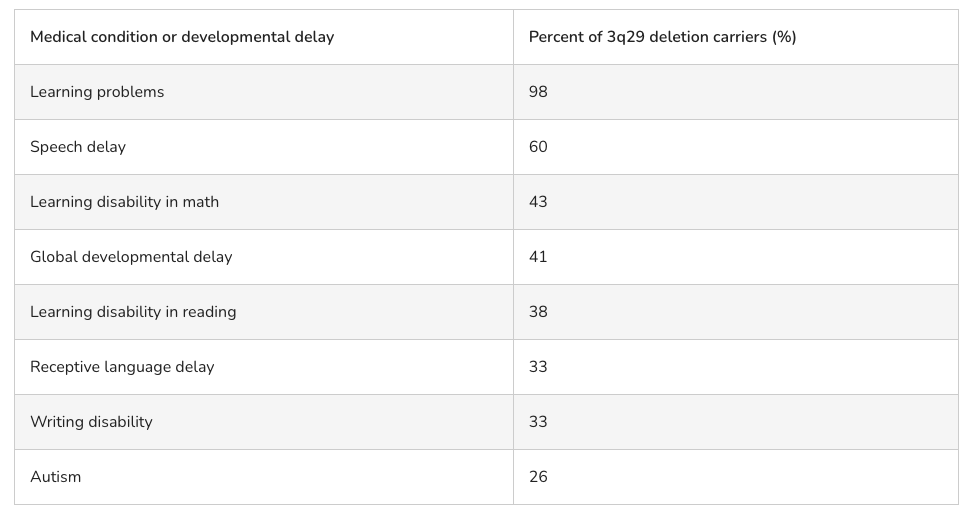What the 3q29 Registry Taught Us About 3q29 Deletion Syndrome
Before 2013, 3q29 deletion syndrome had been described in medical literature but no one knew much about its impact on those affected. So in 2013, the 3q29 Registry was launched to begin collecting and analyzing information about this rare genetic variant.
Families voluntarily enrolled and responded to questionnaires. After a few years, the Registry had data on 44 individuals with 3q29 deletion syndrome which was the largest known sample described to date.
Though it became clear 3q29 deletion syndrome affected people differently, some common findings emerged. These were especially evident in areas of neurodevelopment, psychiatry, feeding behaviors, and the presence of heart abnormalities.
You can read the full study here or continue reading the overview below.
Neuropsychiatric Findings
The research team found that 3q29 deletion syndrome is associated with a wide range of neuropsychiatric features that may surface at different points of development. It’s important to note that the severity of these features vary greatly from one person to the next.
Those studied had a higher risk of developing:
Mild to moderate intellectual disability
Anxiety
Depression
Bipolar disorder
ADHD (attention deficit hyperactivity disorder)
OCD (obsessive compulsive disorder)
Difficulty interacting in social situations
Schizophrenia
ASD (autism spectrum disorder)
Of the 44 people enrolled in the 3q29 Registry:
26% of individuals reported a diagnosis of autism. Learning disabilities in reading, writing, and math were present in ~30-40% of people with 3q29 deletion syndrome.
28% of registry participants report a neuropsychiatric diagnosis. The most commonly reported neuropsychiatric condition was anxiety disorder (19%, n = 8), followed by panic attacks (9%, n = 4, all individuals also reporting anxiety disorder), bipolar disorder (5%, n =2), depression (5%, n = 2), schizophrenia (5%, n = 2), and oppositional defiant disorder (2%, n = 1).
Importantly, the Registry showed people with 3q29 deletion syndrome can have more than one psychiatric condition.
Developmental Delays
Studies on developmental milestones showed that on average, patients with 3q29 deletion syndrome demonstrated a delay across all areas of development. In fact, 98% of those questioned reported some sort of developmental delay.
Children with 3q29 deletion syndrome often have developmental milestones that are delayed by 6 months to a year, on average. As an example of what this means: a typically developing child is expected to start talking at 1 year of age. A child with 3q29 deletion syndrome is more likely to start talking at 18-24 months.
Feeding Problems
The study found a high rate of feeding problems (including refusal to eat, disinterest in eating, failure to gain weight, and failure to thrive in the first year of life) among 64% of participants.
Families reported that these feeding problems and difficulty gaining weight during infancy and childhood were among the most stressful and disruptive symptoms experienced and had the greatest impact on quality of life.
More detailed information about feeding problems with 3q29 can be found by following the link here.
Other Findings
Other notable similarities across the patient population were also identified, including:
Heart defects were reported in 25% of participants, some cases requiring surgery.
Recurrent ear infections occurred in about a third of participants. (This may have something to do with the considerable speech and receptive language delays reported.)
Gastrointestinal issues were very common.
Dental issues were noted in majority of participants.
What to Do With This Information
Because anxiety is so common among those studied with 3q29 deletion syndrome, any symptoms of anxiety should be discussed with your doctor. This is especially true if these symptoms interfere with school attendance or have a negative impact on family dynamics.
Failure to gain weight and feeding problems have been reported to have the greatest impact in quality of life. Especially as oftentimes these symptoms are experienced before diagnosis.
Early intervention and an increase in oral food consumption may help prevent or reduce the negative impacts of poor nutrition on childhood growth and development. This should be a high priority for pediatricians working with children with 3q29 deletion syndrome.
A note on the limitations of this study: Although this is the largest study of 3q29 deletion syndrome to date, there were nevertheless a relatively small number of people who contributed data (n = 44). Another limitation is that the questions were all self-reported, which can sometimes introduce bias. However, the results of this study were highly consistent with later reports (like the one found here) meaning in hindsight, this information was likely accurate.

